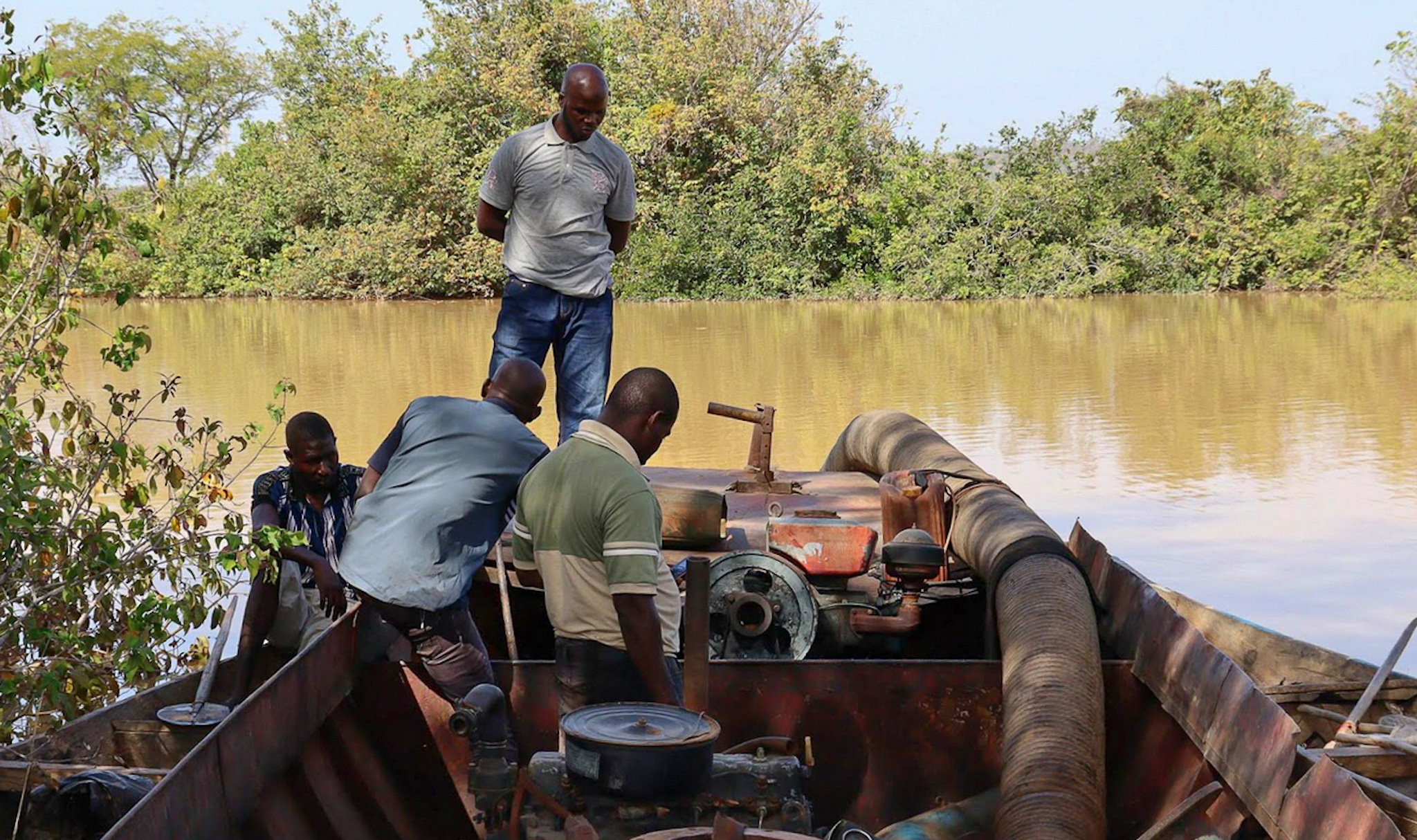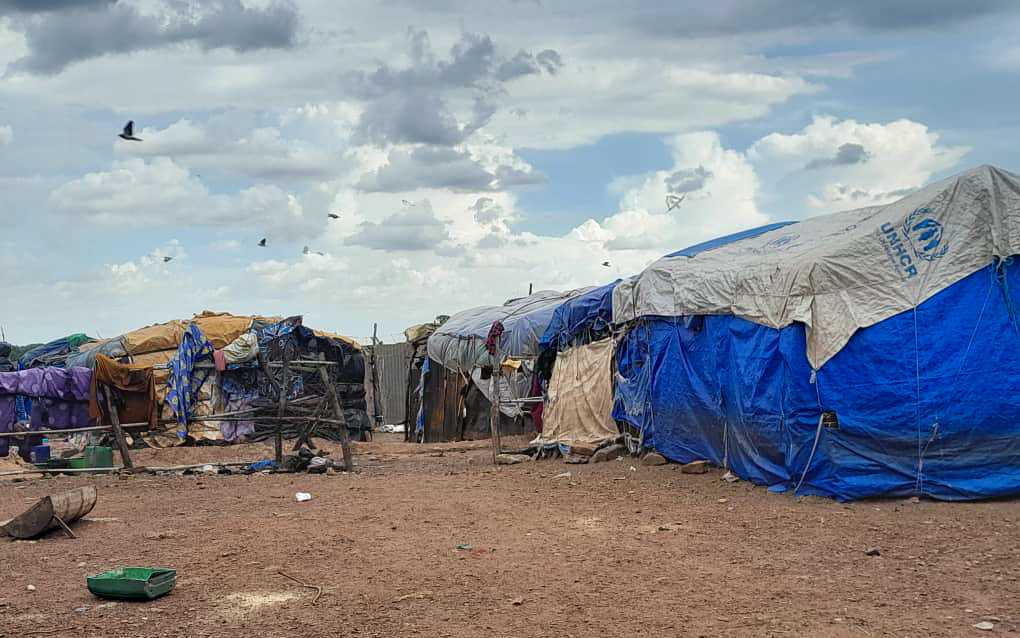Mining sites in southern Mali are exploited in a variety of ways, including dredging. The latter is used to mine gold in rivers. Dredging is a controversial practice that is currently the source of numerous conflicts between local populations and certain mining operators. The commune of Wassoulou Ballé is no exception. Located in the Yanfolila cercle, the commune of Wassoulou-Ballé comprises 37 villages with an estimated population of 59,838 (2013 General Population and Housing Census). This population is active in agriculture, livestock farming, fishing, commerce, handicrafts and gold mining. The commune has not yet been confronted with insecurity linked to jihadism. However, banditry, delinquency and armed robbery are just some of the problems that plague the local population.
The aim of this study is to understand dredging as a form of gold panning, and its impact on the environment and society in the rural community of Wassoulou-Ballé. To do so, we asked the following questions: To what extent is dredging practiced in the commune of Wassoulou-Ballé? What are the impacts of dredging on the community of Wassoulou-Ballé, especially on those who live off the river, the fishermen? What is the local population’s perception of dredging in the area?
Methodological approach
The fieldwork for this study was carried out in October 2021, based on a sample of 237 people, including 24 qualitative interviews and 213 quantitative surveys. To conduct the research, the researchers adopted a mixed-methods approach, combining qualitative interviewing (24 total) and conducting quantitative surveys (213 total) for data collection, and observation. For the qualitative interviews, an interview guide was developed and used for the target group. The quantitative surveys comprised a questionnaire on Google Forms.
Observation consisted of going to the Ballé bridge, 5 km outside the town of Ballé, and taking a canoe to see first-hand how dredging is done, and talking to the people for them to explain how gold is extracted underwater.

© Voice4Thought Academy
Respondents included young people, women’s leaders, and Bozo groups. This sample was inclusive in terms of gender, with women who make their living from fishing and whose daily lives are adversely affected by dredging, as well as some women leaders who shared their views on the phenomenon, accounting for 26% of the respondents.
From gold mining by hand to the use of dredges
In Wassoulou-Ballé, as in all the other terroirs of Wassoulou, gold panning has long been an artisanal activity. It used to be done with the daba (traditional hoe blades), and now we’re seeing more sophisticated means such as dredges. Mme Traoré A.M. Diakité, a kindergarten teacher at Yanfolila Dougoukoro, tells us:
“There is not a single place in Wassoulou where gold does not exist, even in town. Our old mothers used to sweep to support themselves, and everyone in Wassoulou knows that. They used to sweep, pick up the banco (soil) and process it, after which they use the daba, a practice that does not spoil anything. Even if it does, it’s easy to find a way to repair the damage. But with the dredgers on the river, the damage is enormous.” With the dredge, the material from the riverbed is extracted and the small sand fraction, where the gold is locatedm is being seperated from the larger mineral fraction. Dredgers usually use mercury to facilitate this separation.
Mr. B. Diallo, a traditional gold miner and member of the Association of the Goldminers of Mali in Faragouaran, a municipality in the Bougouni region, agrees, saying that before dredges, gold panning was done by hand.
“The way we look for gold here, where we were born, is by hand, using the soil we call ‘Narakanbô‘. Today, with the development of another mining method called ‘Woyon‘ (hard rock mining), there have been innovations that have led to the advent of machines and other equipment such as dredges and work on the ‘brobro‘, the processing of the remaining stone debris bought by the women. What’s new in all this is the arrival of dredgers in the area, a practice previously unknown. At one point, the national directorate of geology and mining came here to Wassolo to research the banks of our river for gold. After their research, these people also started dredging our river here in Wassolo, and since then, all those who had a bit of experience and realized what a dredge could bring in, have gone into the business. Some have even teamed up to buy one, which is why there are so many of these machines at the moment here in Wassolo.” According to B. Coulibaly, a riverside resident, the dredger is an overpriced machine that can cost 5 million and is made in the capital Bamako.
A recent imported practice
Dredging is a recent practice in the area. The practice began between 2011 and 2016, when it was imported and the people involved were mainly from elsewhere. B. Diallo says: “The first people to do it here are from another area, but some of our relatives are doing it today. The Chinese started it in the Kéniéba region of Kayes, where they caused a lot of damage. There’s an association called ‘Djogo ni maya‘ who discovered the activities at the Falémé, a mouth of the Senegal River between Mali and Senegal. They destroyed the river from there, as we know it, in 2013-2014. As a result of this damage, Senegal has banned dredging on its part of the river.”
B. Diawara elaborates: “Most of them are foreigners who come via the Falémé River towards Senegal, because back home they were able to stop the practice of dredging. However the inhabitants of Wassoulou are tending to get involved now too. When the first dredgers arrived here they came with their wives and employers. There were more women than men among them. When they got here, they even asked for other young girls with their parents to come work. A lot of people got involved.”
Some of them came from the Mopti region where many different etnic groups live. President of Cafo in the commune of Wassoulou-Ballé S. Sidibé says: “According to my surveys, there are residents and foreigners, most of whom come from the Mopti region. If we look at the young people, many are trading Mopti for the center of the country. When I asked them why they said they were there to look for money to feed their families, who are in dire straits. It so happens that we have our parents in it, and other people’s children too, who have left their homes to come here.”
It is mostly young people who do the dredging, because of their physical strength and because of unemployment amongst young adults. The men organize and controll the work and employ the young people. As mentioned earlier, women and girls are also employed in the sector, and their job consists of washing the mud to extract the gold, or they cook for the community.
K. Kantao, a dredger from the Mopti region living in Yanfolila: “I’ve been here for 8 years with my wife and children. I’m Bozo and I turn 41 this year. I didn’t know what dredging was. It’s because of the conflict that we left the north. We came to find that it’s done here and we looked for the tools to do it because it’s done in the water, so it’s a Bozo job.” The Bozo people are renowed for their expertise in fishing and boating snd their significant contribution to the export of fish of the country.
However, we mustn’t overlook the local players. As Mme Traoré A.M. Diakité puts it: “The sorcerer doesn’t come to a family without the intervention of a family member.” And according to Mme B. K. Doumbia: “At the beginning it wasn’t the residents, it was only the Bozos and those who have a contract with them, but very recently some residents of our villages have joined them but they remain somehow hidden.”
Film
What does dredging bring to the community? The film ‘Le dragage a Yanfolila sur le fleuve Ballé’ (Dredging at Yanfolila on the Ballé River) by reporter Moussa Sangaré shows different perspectives (film in French).
Economic benefits
Two trends can be discerned in perceptions of dredging for gold in the Wassoulou-Ballé commune.
The first relates to those who defend dredging and are in favor of the practice of gold panning. They claim that a single dredger can employ more than 20 people, each of whom can earn a living improve their living conditions. Based on this economic aspect, they argue that dredging contributes more to reducing youth unemployment than other informal sectors. Moreover, it keeps unemployed young people busy. They also find that the gold they win is a reward for their efforts.
Sir K. Kantao is postive towards dredging activities: “Approximately 9 people work with one dredger. If they work all week, their food money is in it, the fuel and then they share the rest between them. There’s no other job that does what dredging does. On each dredge there’s a washer who’s paid 10,000 francs a week. The women sift the mud like we do with millet. They don’t use any product and put it in the bucket. The cook is paid 50,000 francs a month. Our gasoil comes from the region, as well as our bread, millet and codimentd. In the evenings, the women gather to clean the carpets used in the process of gold mining, with which they also earn money. Dredging has enabled a lot of people to stop stealing and hold-ups; apprentices also earn money. There are also prostitutes who have stopped prostitution because of it, because if they can’t cook, they can clean.”
Impact on environment and public health
In contrast to those who support the practice of dredging, there are others who emphasize the disadvantages of dredging. It is not without negative impact on the environment, the ecosystem, and public health.
First of all, the chemicals used in mining gold is devastating for the environment and ecosystem. 75.2% of respondents said that dredging degrades the water in the river because of the use of chemicals (mercury) in the process of dredging, resulting in a shortage of fish. Chemicals do not only cause the death of fish, but it can also result in the drying up of the river over the long term. Secondly, besides the chemicals it is mentioned that there is also noise pollution caused by the machines digging, which has repercussions femaile fish: it can cause lower reproduction and together with the chemicals cause egg mortality. Another impact on the environment is deforestation which is accelerated by the dumping of chemicals on land and cutting down trees. The wood is used to build the mining pits.
Ms Bakayoko K. Doumbia is very explicit on this matter: “I don’t see any importance other than inconvenience; the practitioners find money but the consequences are for the town’s inhabitants. The Bozos used to find so many fish. They now say the noise of the dredging scares the fish away. There are no more fish. Now the Bozos are farming, wash the gold miners’ bancos to feed themselves, they also plough. Nobody has ever known a Bozo like that but the Bozos of Wassoulou do that. Often the person selling the fish can’t find enough for his family, Often just 1kg or even 2kg, whereas in the past they could leave with around 200kg.” In the same vein, K. Diarra, a fish seller, says: “We used to fill cups and it could go up to 10 kilos. I’ve been here for 23 years and the water has not been like this. This year it has changed a lot. It’s too dusty now. Dredging is of no importance to us. It only brings us misfortune.”
What harms animal health is bound to harm human health. B. Diallo comments: “Take mercury, for example: fish love it. When it’s poured into the water, fish can’t do without it, and the amount consumed depends on the age or weight of the fish. The big fish found in these rivers are the ones that consume the most mercury. Their consumption should be avoided, eventhough we like to eat these big fish, because our stomachs can’t digest them. Mercury in an edible product makes digestion impossible.”
Apart from the fish people consume being poisened with chemicals, the water from the river is also used for cooking, washing laundry and sometimes drinking. All immediate dangers to ones health.
The risk of loss of human life in dredging is very high. Dredge workers can die in the water on operating sites. Dredgers have a way of giving oxygen to their underwater colleagues through a hose. This oxygenation practice can be fatal if the oxygen is cut off to those underwater. Accidents can always happen, but a not often discussed fatal situation is cutting someone off of oxygen on purpose because of jealousy of him harvesting more gold than others.
Another negative factor respondents talked about are the (sexual) relationships between the dredgers and young women working in gold mining. Mme Traoré A.M. Diakité raises the issue: “Why do we say that young girls’ studies are no longer progressing because of gold panning? They work with dredgers to wash the bancos and can earn 100,000 F CFA to 200,000 F CFA with it. But it does not stay with just a job. There is seduction from these dredger. There are violations, divorces, because of a single job. Once seduction sets in, the girls, whether young or old, flock to it, because they find money with the seducers. There’s rape at the moment, then there are illnesses and unwanted pregnancies, and often it’s hard to know who the father of these children is. I don’t see any advantages.”
In view of these enormous drawbacks, the question arises as to how to regulate the practice of dredging in the commune.
The fight against dredging: a challenge for local authorities?
The issue of dredging is cross-cutting insofar as dredging is practiced in watercourses that cross several communes, cercles and regions. Dredging is prohibited by Law N°062 of December 29, 2014, which manages fishing and aquaculture in Mali. It is article 53 of this law that prohibits the practice of dredging and article 125 of the same law punishes offenders of this law with a fine of 25,000F CFA to 500,000F CFA and imprisonment for 11 days to three months.
By virtue of this law, and given the harmful aspects of dredging in the Wassoulou-Ballé commune, the communal authorities have decided to suspend dredging with the support and demand of the population. “There are 12 communes in the Yanfolila cercle, but our commune, Wassoulou Ballé, no longer dredges the river. In collaboration with the traditional chiefs and the mayor’s office, we were able to take measures to chase away the dredgers,” says Souleymane Sidibé, president of the local youth council in the Yanfolila cercle. B. Diawara, President of the Yanfolila communal youth council, recounts the factors behind the success of this battle: “We mobilized the men, the women and the patriarch of Yanfolila. The hunters (Donsos) and fishermen (Bozos) all played an important role in the fight against the practice of dredging, with the support of the mayor, who even made it clear to the councillors that she would not put the dredging money into her communal budget. That’s what prompted us to react.”
But despite this suspension and the various clearance missions, the gold panners refuse to leave the site, as B. Diawara explains: “It’s now nine months since we put an end to the practice of dredging in the commune of Wassoulou Ballé, but unfortunately in many communes they haven’t been able to stop the practice, which is still going on.”
This study also revealed that, due to a lack of logistical resources and security equipment, the local fishing department is unable to cover all the sites, of which there are 20 in the Yanfolila cercle. What’s worse is that some of the dredges belong to certain state authorities based in Bamako.
It is not always the local population who is to be blamed for gold mining activities not being stopped: communal and local customary authorities take advantage of the dredgers’ unstable situation to extract money from them. The dredgers work under the authorization of the mayors and customary chiefs, but in the event of a revolt against them by part of the population, these authorities do not intervene on their behalf, even though they (communal, political and customary authorities) take money from them.
Conclusion
While dredging generally leads to the degradation of watercourses and the environment (contamination of water with chemicals, air pollution by hydrocarbons, imbalance in the aquatic ecosystem), respondents’ perceptions vary on this subject. On the one hand, some see dredging as a source of employment for young people, while others emphasized the disadvantages of dredging for the environment and society, with the loss of human life it can cause. The advantages of this practice are considered minimal compared to the disadvantages.
The commune of Wassoulou-Ballé is an exception among 12 communes in terms of dredging. It has been able to halt dredging for the time being. But in other communes in the Yanfolila circle, the practice continues.
On the base of this study, we recommend to prevent consequences of gold mining rather than to cure them. Given that gold mining creates jobs and brings in money, local authorities must take their responsibilities in the face of this underwater gold mining, while also putting in place alternatives so that those who make a living from this activity do not fall into inactivity. The rate at which dredging is being carried out without effective supervision leads us to believe that in 10 to 15 years’ time, if the authorities don’t get round to supervising it, will result in situations of conflict.





